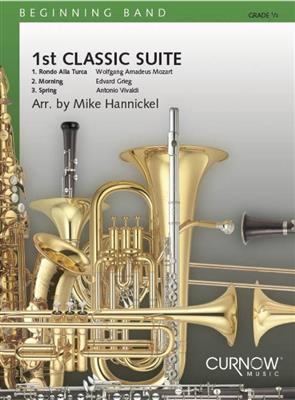Results
-
 £275.99
£275.99UFO Concerto - Johan de Meij
Ufo Concerto, the first solo work by Johan de Meij for euphonium solo, is not a traditional concert work in the classical sense. It is comprised of five movements that are thematically interconnected: Andante - Con moto , Giocoso - Vivo, Andante cantabile, Vivace, and Alla Marcia - Vivace.
Estimated dispatch 7-14 working days
-
 £378.99
£378.99Casanova - Johan de Meij
Who doesn't know the classical womaniser Casanova? Johan de Meij depicts a musical portrait of Giacomo Casanova, who lived in Venice from 1725 to 1798. Casanova captured every woman's heart with great ease and as a result made the Venetian men quite resentful. Accused by the inquisition, he fled the oppressive town of Venice. Johan de Meij created this fantastic work for solo cello and concert band based on this infamous story.
Estimated dispatch 7-14 working days
-
 £87.99
£87.99York'scher Marsch - Ludwig van Beethoven
Beethoven's York'scher Marsch is one of a collection of three tattoos (WoO 18-20) and has had a chequered history, to say the least. There are several autograph copies for different instrumentations, dedicated to different archdukes who were commanders of various regiments of the army including the Prussian regiment called Marsch des Yorkschen Corps, which is how its current title arose. Philip Sparke's arrangement enables a march by this major classical composer to be enjoyed by concert bands.
Estimated dispatch 7-14 working days
-
 £184.99
£184.99Concertino for Percussion and Band - Menno Bosgra
This three-part work was commissioned by Kunstfactor--the Dutch Institute for Amateur Art. Its purpose is to further the repertoire for solo percussionist and orchestral accompaniment--whether brass band, fanfare orchestra or wind band. For a good performance, the soloist should be well-versed in a variety of techniques, and should have a good understanding of the instruments not only technically, but also musically. In terms of the selection of instruments and also technique, the first and second movement are more classical in style, while the final movement--with a set-up of various so-called 'untuned' instruments--is more suited to contemporarysolo kit playing. These distinctions will become clear to the soloist while studying the piece. (Menno Bosgra)Movement One requires timpani and tambourine;Movement Two requires marimba and vibraphone;Movement Three is a set-up of: five untuned drums (bongos and toms), large drum (standing), large floor drum or smaller bass drum (lying down), cowbell on a stand, suspended cymbals, Chinese cymbal and small drum.
Estimated dispatch 7-14 working days
-
 £274.99
£274.99Symphony No. 1 - Vasily Sergeyevich Kalinnikov
Jan Cober is famed worldwide as a conductor for wind orchestras of renown. He also produces transcriptions for carefully selected works from the classical repertoire. The Russian composer Vasily Sergeyevich Kalinnikov (1866-1901) has never enjoyed great fame, probably due to his short life. Jan Cober discovered this work through intensive research and his transcription has given it a second life on the concert stage.
Estimated dispatch 7-14 working days
-
 £149.99
£149.99Puccissimo - Giacomo Puccini
The intensive purity of the melodies of Puccini motivated Steven Verhaert, himself an orchestra musician, to make thisarrangement. He has chosen the most beautiful arias and made a splendid classical medley of them, which was recorded by "The Danish Concert Band" on the "Absalon" CD.
Estimated dispatch 7-14 working days
-
£78.95
Canon for Christmas - Larry Clark
Johann Pachelbel's Canon in D has long been one of the most popular classical pieces, and has already been connected to Christmas through various setting of the piece. In this arrangment, the Canon is combined with popular Christmas carols as part of the fabric of the piece. Carols like Hark, the Herald Angels Sing and The First Noel fit nicely over the harmonic progression of Pachelbel's famous canon. This arrangement will work nicely with band alone or with the option to include choir (CM9401).
Estimated dispatch 7-14 working days
-
£94.99
Symphony No. 40 in G Minor - Wolfgang Amadeus Mozart
Mozart belongs to everyone! The experience of actually playing Mozart's music makes him real and more than just a name we associate with old music. Stephen Bulla's arrangement of the first movement of what may arguably be Mozart's greatest symphony has a great deal of authenticity. Much more than many "just the tune" type transcription/ arrangements, Mr. Bulla's work ambitiously explores a good portion of Mozart's miraculous musical development, so that your musicians can begin to understand the true genius of the Classical icon. Those who know Mozart will appreciate the integrity of the transcription. Those who don't know Mozart have a wonderful treat in store!A classic!
Estimated dispatch 7-14 working days
-
 £37.50
£37.501st Classic Suite - Mike Hannickel
This is an opportunity for you to introduce some great classic melodies to your beginning band. The Baroque, Classical and Romantic periods are represented in creative and accessible ways so that your students can be successful in concert and gain a real feel for some of history's great composers. You can also work with the History department to do some cross-curricular study. The suite format means that you can perform all three pieces in order, play only the movements your group has time to prepare, or intersperse the three sections with other groups or soloists you may choose to program. Any way you use it, this is a solid educational tool. Useful!
Estimated dispatch 7-14 working days
-
 £104.99
£104.99Bliss - Jacob de Haan
Bliss: Impressions of a Village contains three impressions of a village in the beautiful Brabant province in the Netherlands. The fi rst movement is in a very 'classical style' and, appropriately, captures the village's history. Saxophones and a glockenspiel follow the path of a small, playful river. The entire band join in as the small river approaches an ancient castle. The third movement contains lots of interesting rhythms portraying the hustle and bustle of everyday life in the village.
Estimated dispatch 7-14 working days
